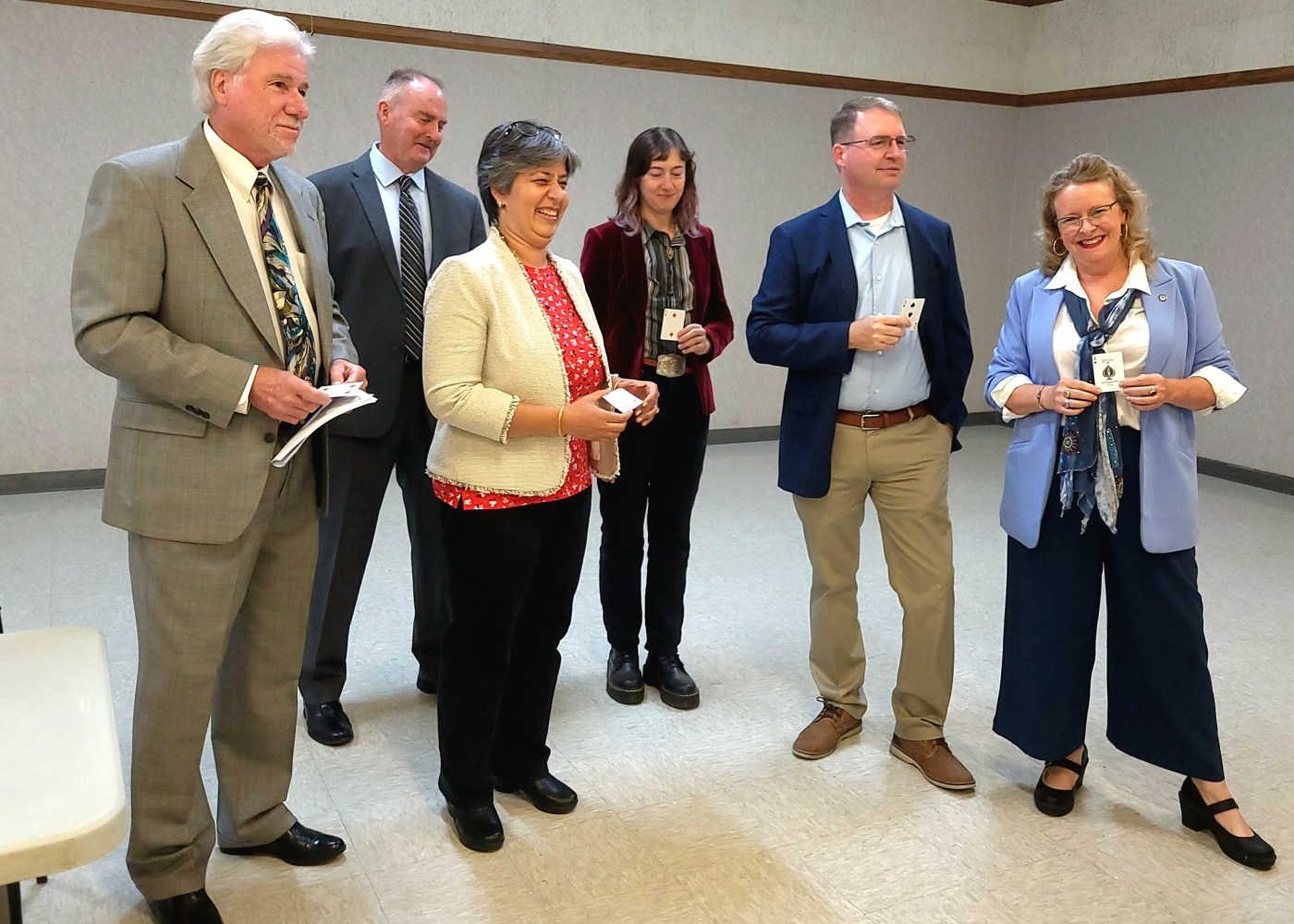CHICO — A week before ballots go out and five weeks until election day, Chicoans got an opportunity to see candidates face to face — and facing off — Monday night in a forum hosted by the League of Women Voters.
Around 200 people — more than the chairs originally set up — came to the Chico Masonic Family Center for the forum. The league’s Claire Greene served as moderator.
The first hour featured six of the eight council candidates: Mike Johnson and Michael O’Brien in District 1, Dale Bennett and Monica McDaniel in District 3, and Bryce Goldstein and Deepika Tandon in District 7.
District 5 candidate Katie Hawley attended but was not part of the forum because her opponent, Melissa Lopez-Mora, had a scheduling conflict. The league’s “empty chair rule” precludes a candidate from participating absent a challenger in their race, though she could speak with audience members individually.
“I’m sad,” Hawley said as audience members settled into their seats. “I want to share my message — but I understand the rules.”
The second hour had all the Chico Unified School District board candidates: James Bishop and Gayle Olsen in Trustee Area 2, and Michele Cooper and Teisha Hase in Trustee Area 3. Hase, recovering from knee surgery, sat with her right leg elevated.
Bennett and Tandon are the only incumbents running, though O’Brien previously served as an appointed councilor. All the school board aspirants are newcomers.
Council
Candidates drew playing cards to determine the speaking order for their opening statements. McDaniel, Goldstein, Johnson, Bennett, Tandon and O’Brien introduced themselves in that sequence, then fielded questions culled from audience submissions.
The first question coincidentally went first to Goldstein, a renter, asking about the difference between rent control and rent stabilization along with how to keep seniors in their homes. She noted the terms often are used interchangeably, but stabilization is the mechanism sought for senior mobile home parks; McDaniel clarified that rent stabilization is gradual and allows for predictability.
Bennett, by contrast, said he sees “absolutely no difference” in the terms. Tandon explained the costs incurred by property owners and the supply-demand impact on rents. O’Brien called himself “a free market capitalist” and seeks a solution equitable to both tenants and landlords.
Homelessness came up next. Johnson pointed to Everhart Village as a good response to the problem and supported a campground. Bennett said the city has “adequate resources” at Genesis and the Torres Shelter — and Tandon said she opposes building a new shelter or campground until assured that chronically unhoused people will use them.
O’Brien, a former police chief, stressed “compassion and accountability,” saying leaving a drug-addicted person under a bridge exemplifies neither. McDaniel highlighted “options that people can choose that are humane” such as a managed campground. Goldstein echoed the push for a managed campground as part of a spectrum including shelters and transitional housing.
Asked specifically about the campground proposal the North State Shelter Team submitted to the city, Johnson expressed support; Bennett said the group still needs to identify a site and apply for permits, the latter reiterated by Tandon; O’Brien prioritized clearing public spaces first; McDaniel called for ways for campers “to feel human again”; and Goldstein called for proactive engagement by the city with service providers, including NSST, which she said is gauging feasibility of its plan before zeroing in on specifics.
The brisk session also covered public transit, downtown parking, roads, fire prevention and water. Candidates made closing statements in reverse order of the opening statements, and the league shifted gears after 75 minutes.
School board
While the council candidates (including Hawley and Lopez-Mora) gathered previously for forums hosted by the Chamber of Commerce and by realtors and property owners, this was the first big appearance for the school board candidates. By the time the session started, 90 minutes after the first, half the audience dissipated.
Bishop and Cooper are parents; Hase and Olsen are retired classroom teachers as well as parents. Bishop, Hase, Cooper and Olsen (in that order) touched on their backgrounds in their introductory remarks.
School board candidates, left to right, Teisha Hase, Michele Cooper, James Bishop and Gayle Olsen field questions at the League of Women Voters forum Monday, Sept. 30, 2024 in Chico, California. (Evan Tuchinsky/Enterprise-Record)
The first question broached diverse students feeling safe at school. Hase said she wants to focus on foster youth, mental health and special education. Cooper spoke to staffing levels, particularly in special ed; her husband is a special ed teacher.
Olsen posed looking at “what’s equitable, not necessarily what’s fair” — citing individual needs. Bishop spotlighted innovation, particularly for “kids who don’t learn in traditional ways.”
On banning cell phones in schools, Cooper said “the board had a good policy in place, they’re just not enforcing it”: namely, all cell phones to be put away during learning times. “Cell phones drove me crazy,” Olsen said, and affirmed the policy.
Bishop called cell phones “a larger social issue” with parents controlling kids access to social media. Hase said 90% of disciplinary issues in her freshman classroom involved phones and likewise supported the priority.
Related Articles
Teisha Hase emphasizes education about mental health issues | Chico Unified School District Trustee Area 3
Michele Cooper hopes to bring hiring experience to understaffed district | Chico Unified School District 3
Trump makes false claims about federal response as he campaigns in area ravaged by Hurricane Helene
She was accused of murder after losing her pregnancy. SC woman now tells her story
Donald Trump suggests ‘one rough hour’ of policing will end theft
Asked about budgeting priorities, Hase noted the complexity of the budget and cited facilities as the most pressing issue, as evidenced by Measure C on the November ballot. Bishop said he, too, supported the Measure C bond on the November ballot, “but we need decisions to move forward so we’re not in the same place again.”
Hase also supported Measure C but emphasized the importance of attracting and retaining staff; “schools are a people business,” she said. Cooper said she’d prioritize hiring student resource officers and attributed CUSD’s enrollment decline to students and parents’ trust in the district.
Addressing challenges to books or curriculum, Cooper called for committees for both, saying parents should be involved in their kids’ curriculum and that books should be age-appropriate to the school. Olsen noted curriculum comes from the state and adopted by districts with parental input, and Hase elaborated on books lists from which teachers and librarians choose. Bishop distilled the issue to activism; “I find if people understand all the facets of what’s going on, that brings people together.”
Other topics covered were student scores in relation to the state’s dashboard, vaccine mandates and charter schools. After 45 minutes, closing statements capped the forum.













+ There are no comments
Add yours